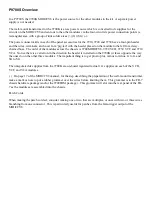
4 General safety instructions
CAUTION
Reaching into the area of the joint mechanism
Pinching of limbs (e.g. fingers) and the skin due to uncontrolled
joint movement
►
Do not reach into the joint mechanism during daily use.
►
Close attention is required during assembly and adjustment
tasks.
CAUTION
Mechanical damage to the product
Risk of injury due to change in or loss of functionality
►
Use caution when working with the product.
►
If the product is damaged, check it for proper function and readi
ness for use.
►
In case of changes in or loss of functionality, do not continue
using the product (see "Signs of changes in or loss of functional
ity during use" in this section).
►
Take any necessary measures (e.g. repair, replacement, inspec
tion by the manufacturer's customer service, etc.).
Signs of changes in or loss of functionality during use
Changes in functionality can manifest themselves, for example,
through a changed gait (swing phase, stance phase), incomplete
extension, stiffness and the development of noise.
5 Scope of delivery
The scope of delivery is shown in Figure
1
on page 2.
Only product components with reference numbers in the illustration
can be reordered separately.
6 Technical data
The technical data are shown in Figure
2
on page 2.
: Proximal system height (PSH);
: distal system height (DSH)
12
7 Preparing the product for use
7.1 Information on fabrication of a prosthesis
CAUTION
Incorrect alignment, assembly or adjustment
Injury due to incorrectly installed or adjusted as well as damaged
prosthetic components
►
Observe the alignment, assembly and adjustment instructions.
CAUTION
Initial use of the prosthesis by the patient
Fall due to lack of patient experience, incorrect alignment or incor
rect adjustment of the prosthesis
►
For the safety of the patient, use a suitable device (e.g. parallel
bars, handrail, wheeled walker) during initial standing and walk
ing.
7.2 Bench alignment of the prosthesis
INFORMATION
The prosthetic components and prosthesis shown in the illustrations
are used as examples to illustrate the general process. The instruc
tions for use of the prosthetic components selected for the patient
contain detailed information and have to be used for fabrication of
the prosthesis.
►
CAUTION!
To enable the patient to stand safely, align the pros
thesis using the alignment images for the sagittal plane
(Figure
3
on page 3) and for the frontal plane (Figure
4
on
page 3) as well as the instructions for use of all prosthetic com
ponents that were used.
►
Additionally, observe the following points for the bench alignment
of the prosthesis:
►
5
on page 4: Mount the prosthetic joint with its extension assist
cable as shown in the illustration.
Summary of Contents for 3R15
Page 1: ...Instructions for use 10 15 3R15 3R49...
Page 9: ...6 mm 634A58 Isopropyl alcohol 4B74 20 4X24 5 K 25 Nm 0 mm 9 Maintenance 15 9...
Page 16: ...1 1 1 2 1 1 1 J 2 3R15 3R49 16 3R15 3R49 3 3 1 3 2 3R15 1 2 100 kg 1...
Page 17: ...2 3 3 17 3 4 10 C 60 C 0 90 100 250 1100 3 5...
Page 18: ...3 5 4 18 5 1 2 6 2 2 PSH DSH 7 7 1...
Page 19: ...7 2 3 3 4 3 5 4 7 3 19 6 4 Spina iliaca anterior superior 6 4 7 4 7 8 9 5 6 9 6 45...
Page 20: ...10 6 45 90 11 7 20 12 7 20 7 5 13 8...
Page 21: ...7 5 1 3R6 3S106 8 8 1 21 8 2 1 2 3...
Page 22: ...9 30 14 8 22 4B74 20 4X24 5 K 15 9 634A58 10 11 11 1...
Page 23: ...11 2 2017 745 CE 23...










































